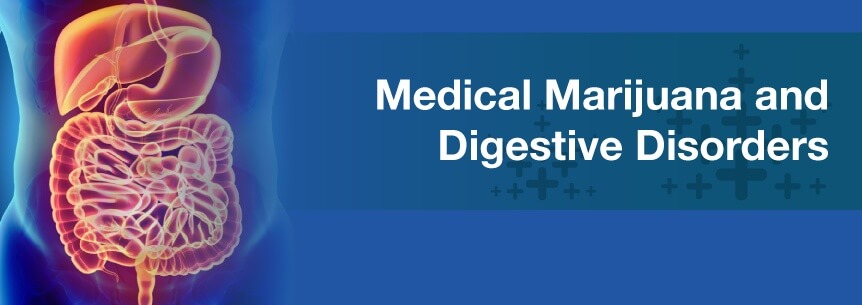
Digestive disorders can be annoying at best and debilitating at worst. Many people are all too familiar with just how uncomfortable — both physically and emotionally — dealing with digestive problems can be. To make matters worse, treatment options may be ineffective, and even when they do provide relief, can involve unwanted side effects. The good news for those dealing with digestive disorders is that marijuana can be a uniquely beneficial solution. This wonder plant promotes gut health through natural and effective means.
To get the necessary nutrients out of the food you eat, your body must break food down into smaller parts and ultimately into a form it can actually work with. The digestive process begins as soon as you start chewing and continues throughout your entire gastrointestinal (GI) tract until you discard the leftover waste through your stool.
Your GI tract isn’t the only part of the body involved in digestion. Your pancreas, liver and gallbladder play important roles too. Your muscular system, nervous system and hormones also contribute to the process.
Since digestion is a complicated process involving numerous parts of the body, there are many ways by which it can be disrupted. Though some disruptions may be due to short-lived problems such as a viral infection, others can be associated with more long-term issues. These issues are considered chronic digestive disorders.
Common chronic digestive disorders include Irritable Bowel Syndrome (IBS), Inflammatory Bowel Disease (IBD) — which includes both Ulcerative Colitis and Crohn’s Disease — and gastroesophageal reflux disease (GERD).
Since disorders can affect different parts of the digestive system, symptoms can vary. Some common symptoms of digestive disorders include:
Digestive problems are extremely prevalent. According to the National Institute of Health, digestive diseases affect 60 to 70 million people in the United States. Some more statistics that highlight the severity of the issue are:

Most Americans suffering from digestive disorders seek relief through a few different means. Though medical emergencies like gastrointestinal bleeding or appendicitis require surgery, most digestive disorders are treated through conventional medicine, natural supplements, and lifestyle changes.
Conventional medicine used to treat digestive conditions is typically aimed at either preemptively or reactively treating symptoms in order to minimize the effects of the disorder on a patient’s daily life. While some medications can be effective in treating symptoms, they typically cause some unfortunate side effects as well.
For example, proton pump inhibitors used to treat stomach acid issues such as GERD can cause other digestive issues, including nausea, vomiting, diarrhea, stomach pain, constipation, and gas. Patients with Crohn’s Disease are often prescribed steroids, which can cause many short-term side effects such as mood swings, insomnia, and weight gain, as well as more serious long-term effects like high blood pressure or glaucoma.
In addition to prescription medications, individual symptoms can be targeted through over-the-counter options such as antacids, antispasmodic or anti-diarrheal meds. These medications are typically not intended to have lasting healing effects but simply to provide temporary relief from symptoms.
Patients who are wary of the side effects of conventional pharmaceuticals may turn to natural supplements as a healthier alternative. Supplements can help the body compensate for mild digestive problems and may even have longterm healing effects in some cases. For example, when the digestive tract becomes imbalanced, probiotics can help replenish good intestinal flora. A digestive enzyme supplement can assist the stomach in producing more acid in order to more effectively break down food. Natural substances like papaya and ginger root have also been shown to aid in digestion.

Certain lifestyle changes can also be a means of managing digestive disorders. These changes are typically focused on regulating the diet to avoid problematic foods and drinks. These foods and drinks can differ from person to person, but common ones to avoid include:
IBS can become so severe that some patients may find the list of foods they can consume shrinking while the list of foods to avoid continues to grow. Foods that are typically considered mild can still cause problems for an unhealthy GI tract.
Considering the limited benefits and sometimes dangerous side effects of conventional treatment options, it is no wonder those with digestive problems may become interested in alternative treatment options. Though clinical research on medical marijuana’s benefits is limited, the research that does exist demonstrates what many people already know from firsthand experience — that cannabis is powerfully effective at fighting pain, inflammation, and nausea.
Cannabis interacts with the gut through the endocannabinoid system (ECS), a network of cell receptors — called cannabinoid receptors — and chemical compounds — called endocannabinoids — found throughout the body. The ECS’s main responsibility is to balance and regulate various functions of the body, including:
Levels of cannabinoid receptors and endocannabinoids can make the difference in a healthy and an unhealthy gut.
Opponents of medical marijuana use have presented the Schedule III drug, Marinol, as a legal alternative to cannabis. Though this drug is meant to offer the same benefits as cannabis, it merely contains a synthetic form of THC. This THC is intended to stimulate the appetite and reduce nausea. The cannabis plant, on the other hand, not only contains THC but numerous other cannabinoids as well. The combination of all of these components is what makes marijuana effective at not only stimulating appetite and controlling nausea but managing pain. Another advantage of cannabis over Marinol is that it is inhalable. This is especially relevant for patients who may have trouble keeping a pill down due to nausea-induced vomiting.
When taken in appropriate doses, which can be determined with the help of medical supervision and a patient’s own self-regulating, cannabis has very few potentially negative side effects. Still, it is important to consider these side effects and how they might impact your daily life. Medical marijuana use can cause:
Some of these side effects may be desirable for some patients. For instance, digestive problems like IBS, indigestion, and heartburn are often coupled with insomnia. For those who have digestive disorders and also have trouble sleeping, the side effect of drowsiness can actually be helpful.
Specific strains of marijuana can be used to target symptoms associated with digestive disorders or side effects of medications taken for digestive problems. The best strains for some common symptoms are listed below.
Many digestive disorders and even temporary digestive upsets can cause painful abdominal cramps and diarrhea. In addition to cramping, diarrhea typically involves urgent trips to the bathroom that result in loose stool. Experiencing cramps and a loss of control over your bowels can be unsettling both physically and mentally. The following strains are helpful in curbing the effects of abdominal cramping:

Diarrhea can cause more than just physical discomfort or embarrassment. Especially if it lasts for an extended period of time, having diarrhea can also cause fatigue. Other digestive problems can also result in fatigue. As mentioned previously, insomnia is often paired with digestive disorders, so fatigue can result from lack of sleep as well. If you regularly suffer from fatigue, you may even have Chronic Fatigue Syndrome. The following strains of marijuana are especially good at providing energy and fighting fatigue:
Nausea consists of an uneasy sensation in the stomach sometimes referred to as feeling queasy. Nausea often precedes vomiting. Treating nausea and vomiting can be difficult since ingested medicines likely won’t have a chance to be absorbed into the bloodstream before being expelled. This is where the ability to vaporize marijuana becomes especially handy. The following strains are especially helpful at fighting nausea:
Digestive problems can sometimes cause a depressed appetite which can lead to unhealthy weight loss. Cannabis is known for its appetite-stimulating properties which can be especially helpful for those experiencing loss of appetite. The following strains are exceptionally effective at restoring appetite:
Anxiety disorders can cause feelings of upset stomach, and likewise, digestive problems can cause anxiety. Depression is also sometimes a byproduct of digestive disorders, especially when they are severe and disruptive of everyday life. Fortunately, anxiety and depression can both be combatted naturally through cannabis use. The following strains are known to improve mood and fight against feelings of depression or anxiety:

Digestive disorders are often inflammatory in nature. Inflammation is the body’s immune response to heal itself and defend against perceived threats. While inflammation can serve a necessary and helpful role, it can also go awry. For those with IBD, for instance, immune cells needlessly attack the GI tract. Inflammation in the body can lead to long-term complications such as heart disease and cancer. The following strains of marijuana can help provide relief from inflammation:
Now that you understand just how beneficial medical marijuana can be for treating digestive disorders, you may need more information on how to legally become a medical marijuana user. Since marijuana’s legal status as a form of medicine is rather recent and is limited to certain states, regulations can be confusing.
In order to determine the best path forward, you should take advantage of the resources offered by MarijuanaDoctors.com. These resources will help you learn more and can assist in finding a marijuana doctor or a cannabis dispensary. We prescreen doctors to ensure that all are qualified to guide you in your selections and treatment. Once you are able to obtain a medical marijuana card, you’ll be able to shop for whichever strains are best for your digestive needs. The journey to better gut health can begin today.
For more information, find a medical marijuana doctor in your state today!
Find A Doctor Find A Dispensary